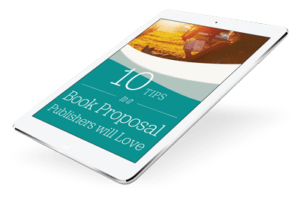“Should I Write a Book Proposal?”

People often ask me whether they should write a book proposal. It’s a good question to ask.
Before you put dozens of hours and, perhaps, thousands of dollars, into a writing and editing a book proposal, make sure it’s good use of your time, energy and money.
I received an email today from someone who wrote a book about leading a happier, more joyful life. He’s looking for a ghostwriter to write his book proposal.
It may be a wonderful book, but before I even look at it, here’s what I know:
a) The idea sounds pretty general to me. That’s not a good sign. A book needs to stand out and offer something fresh to captivate agents and publishers.
b) If the audience is also general, it’s going to be a tough sell unless the author has a large platform.
There are actually many reasons to consider this question carefully. Even if you can attract a traditional publisher, is that the best fit to reach your goals? It depends.
Before You Write a Book Proposal
Ask yourself these questions before you write a book proposal:

Do I definitely want a traditional publishing deal?
There are advantages to self publishing. With self-publishing, you control the content, cover, title and final edits, among other decisions. With self-publishing, you’ll have your book faster. And Amazon even gives some advantages to authors who publish with their self-publishing arm, Amazon KDP. You will also get to keep a higher percentage of each book sale, perhaps making $5 or $6 per book instead of a dollar or so.
Does my book and platform have what it takes to attract a publisher?
* Does my book have the freshness to interest a publisher? Your book needs to stand out as somehow unique in the marketplace. Fresh can mean you offer a new perspective on a subject, include current research not found in earlier books or address a niche audience or need hitherto ignored. A fresh writing voice can also make your book attractive.
* Is the market large enough? How desperately does my audience need this information? The more desperate they need it, the more likely they are to buy a book to help them.
* Is this a market or audience that would be easy to reach? Some markets are easier to reach than others. There are plenty of parenting websites to reach parents. And there are sites for specific parenting challenges such as autism. The more resources or ways to reach readers through specific websites, organizations, associations or media, the easier to reach readers in your niche.
* Do I have the platform (reach/following) publishers are looking for? Publishers want to know that you already reach people in your target market. Before investing resources into publishing your book, they want to be sure that there’s a group of people who are already waiting to buy it—people who know, like and trust you.
The more competitive the category you’re writing in, the larger your platform needs to be. Your platform includes all the ways you reach people—social media, speaking, teaching webinars, blogging, through your email list, etc.
* Do I have the track record to interest publishers? Track record doesn’t mean you can’t be a first time author. Publishers love discovering first time authors. Rather, publishers are looking to see whether you have experience in the activities you list in your book’s promotion plan.
If you plan to market your book through teleseminars, webinars, speaking gigs, social media, blog posts and/or TV appearances, have you actually done these things? It’s okay to list a few activities that are a stretch beyond what you’ve done, but, for the most part, your promotion plan should build upon a foundation you have already established.
Of course, it’s okay if you’re not there yet. If you know you want a traditional publishing deal, you may just need to work further on a fresh concept. This is an area I LOVE to help new authors explore.
Or you may need to grow your author platform by identifying the platform building activities that interest and excite you and that will help you connect with your target readers. Many of my clients started with virtually no platform at all and built one over time by connecting with readers through blogging, setting up speaking gigs, engaging on social media, teaching teleseminars or hiring a publicist for traditional pr.
One of my biggest tips to aspiring writers is to build your author platform in a way that helps you make money as a writer, speaker, teacher, etc. I call it a “sustainable plan” because the money you bring in continues to help you grow your platform and—once your book is published—sell books.
[bctt tweet=”5 Reasons You May Decide Not to Write a Book Proposal” username=”LisaTener”]
Why would you decide to save time and money, skip the book proposal and self publish?
-

Authors Gus Ferrer, MD and Burke Lennihan, RN, self-published Cough Cures in order to get the book to market quickly. You want complete control over design, editing, title, content and marketing your book. A traditional publisher will not give you that kind of control.
- You want to have your book out there fast—making a difference in people’s lives as soon as possible, attracting ideal clients to your business or helping you get speaking gigs.
- You know you don’t have a big enough reach/platform to interest publishers in this particular genre or subject area.
- Your book concept isn’t likely to attract publishers. This can happen when the market is small, the book doesn’t stand out enough from other books in its category or, for any reason, the publisher doesn’t think it will sell enough copies for them to make an investment. It doesn’t mean your book is not worthy. You may consider going back to the drawing board and exploring how to make the book concept more fresh or compelling. However, you may also decide that it’s not worth all that work when you know there is interest in your book and a market for it right now. Go back to your own vision and goals for your book to make a decision.
- You don’t necessarily want to sell thousands of books. Perhaps you plan to leverage your book as a business-building tool. In that case, perhaps you can meet your goals by self-publishing and have the book working for you much sooner.
“Should I Write a Book Proposal if I Plan to Self-Publish?”
If you plan to self-publish, some version of a book proposal may still be useful. A book proposal can help you get clearer about your book concept and also help you write a more marketable book. A book proposal can be considered a business plan for a book. Here are some reasons to write a book proposal regardless of how you plan to publish:
- It’s helpful to compare your book to others in the field before you write the book, so you can get clearer on how your book may stand out.
- You may get more clarity on the markets for your book, both primary markets and secondary niche markets.
- It’s a valuable exercise to develop a selling handle. Think of the selling handle as an elevator speech (but shorter than a speech) for your book: one sentence or less that gives someone a strong idea of what problem your book solves, who it’s for and what benefits readers might get from it.
- Unless you plan to just sell a few copies, you want to develop momentum for book sales, even before the book comes out. Your book proposal can include your plans to build your platform, pre-publication.
- You will need a promotion plan for your book. The sooner you develop one, the more prepared you will be for pre-launch and launch activities.
- A book plan should be sustainable, in my experience. That is, your book should help bring in income in more ways than just book sales. It should attract opportunities that bring you additional income, such as speaking fees, training fees, consulting income, coaching income, income from expert witness work, or income through other activities. Your book proposal can address this.
- Ideas for spin-offs can help you view the book in a more expansive way, as part of a series, and help you plan ahead, planting seeds for more books. For instance, your book can include a final pages that attracts interest in the next book in the series.
I would caution you, however, not to go overboard. If you are writing a book proposal only for planning purposes and not for publishing purposes, you can look through the sections of a proposal and decide which sections to address. You can use bullet points and lists. It does not need to be polished in the way a book proposal needs to be polished for a publisher.
Will An Agent or Publisher Accept a Book Without a Book Proposal or With a Shorter Book Proposal?
Many authors hope to get away with submitting a manuscript, rather than a book proposal. For the most part, publishers want to see a proposal. If you send them a book, you’re likely to end up in the slush pile for not following directions. Don’t waste your time and theirs.
Sometimes you can get away with a shorter book proposal. A huge online presence, the need for speed with a time sensitive subject or a previous book of yours published by the same publisher may be reasons you can go shorter. Read my Huffington Post article The New Short Book Proposal for the ins and outs of when and how to write a shorter book proposal.
There are a handful of literary agents who will look at a manuscript without seeing a proposal first, particularly if the book is a memoir (we are talking nonfiction here, since that is my expertise, not novels). These agents may eventually require a proposal but are willing to look at the manuscript (or even the first 50 pages) before requiring a proposal.
How do you know whether an agent wants to see the manuscript first? They will indicate that on their website or tell you that if you meet them in person at a writers conference.
However, I still encourage you to the write the book proposal before contacting literary agents. It will help you write a more marketable book in the first place. In addition, it’s much better to respond quickly for a request for the proposal, while the agent feels excited about your book and the concept feels fresh to them. A month or two later, your idea may not feel so fresh anymore, even if it is.
 Have any questions about how to write a book proposal, self-publishing or how to write a book? Ask away (as a comment below). And download my 10 Tips for a Book Proposal Publishers Will Love.
Have any questions about how to write a book proposal, self-publishing or how to write a book? Ask away (as a comment below). And download my 10 Tips for a Book Proposal Publishers Will Love.

